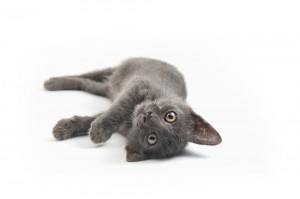Feeding Your Kitten
FEEDING PROPERLY FOR GOOD HEALTH
Kittens are full of energy. They bounce off the walls, jump through the air, and pounce at anything that moves, like toys and feet. All this energy has to come from somewhere in that tiny body. Feeding your kitten the right nutrients will keep their energy up and support their rapid growth rate.
NUTRIENT NEEDS
Cats have evolved to be complete and true carnivores, or meat-eaters. This is why they have unique nutrient needs. It’s impossible for their bodies to convert the nutrients other animals can get from plants, so they get their vitamin A naturally from a prey’s organ meat, taurine from muscle tissue, and essential fatty acids from animal fat sources. Because of this, their requirements for certain nutrients like those mentioned, and including protein and niacin, is higher.
THE GROWTH OF YOUR KITTEN
When a kitten is born, she will weigh about three ounces, and will gain a half an ounce every day. By the time she is ten weeks old, she’ll be about 2 pounds. That means she’s gained ten times her weight in ten weeks! Male and female kittens grow similarly in the beginning, but by the time they are ten weeks old, the males begin to outweigh their sisters. Also, females will stop growing at about 8 to 9 months of age, while the males will continue to grow until they are eleven months.
THE FEEDING REGIMEN
Your kitten will be on mom’s milk only until they are three to four weeks old, when they start adding solid food to their diet. Weaning happens at about ten weeks old. When providing your kitten with solid foods, give them soft, meat-based (canned food) diet. With barely any teeth and a tender stomach, this type of diet will be easier on them.
WHEN THEY ARE WEANED
After your kitten is weaned, it’s your responsibility to provide a diet that is complete and offers all the right nutrients in proper proportion. The best diet is foods specially formulated for kittens since they are more nutrient-dense. However, a diet labeled “all-stages” supports your kitten’s growth as well. The nutrients zinc, phosphorus, calcium, vitamin A & D, thiamine, taurine, and essential fatty acids are especially important. Your kitten needs all of these ingredients to support her rapid growth and development. A diet that is otherwise sufficient but deficient in just one nutrient, like zinc, can cause poor growth, skin lesions, and other deformities.
PALATABILITY
Your kitten should have a healthy appetite as long as the food is yummy to her. Tastiness depends on the foods smell, taste, and texture. If you want your kitten to be less selective as an adult, it’s a good idea to feed a variety of flavors of food. As your kitten grows up, you can begin to feed a complete and balanced dry food along with canned, or slowly wean them off of canned altogether. What you feed your kitten should be consistent though to avoid digestive upset or diarrhea. If your kitten is still having difficulty with dry food, you can moisten it with warm water to make it easier to consume.
BE WARY OF “ADULTS ONLY”
Do not feed your kitten any diet labeled “maintenance” or “adult”. Specially formulated kitten food contains 35% protein, and has12-24% higher fat content and about 25% higher calorie content than adult diets. All this is essential for your kitten to have complete nutrition. That is why it’s important to feed your kitten a diet that is labeled “kitten” or “100% complete and balanced for all life stages”.
OVERFEEDING
It’s practically impossible to overfeed your kitten from a very young age to up to three or four months. She’s going to need 250 kilocalories of energy per kilogram of body weight per day when she is 10 weeks. This is about eight or nine ounces of wet food, or three ounces of dry. The amount of kilocalories per kilogram of body weight decreases significantly at around five months of age from 250 to 100-130 kilocalories needed, which is closer to an adult. Most kittens will become adult size and weight at around eight months. This is when they require about 1 ounce of wet food or a half ounce of dry per pound of body weight.
HAS KITTY LOST HIS APPETITE?
If your kitten is frisky and playful, he is doing just fine. When it comes to his food, you should only be worried about providing him a good quality, well-balanced diet. You should always be comfortable consulting your veterinarian about any concerns regarding your kitten’s diet. If he hasn’t eaten in 48 hours, talk to your veterinarian. See your veterinarian immediately if symptoms like vomiting and diarrhea accompany a lack of appetite. In a case such as that, dehydration is more critical than a decrease in food consumption.

